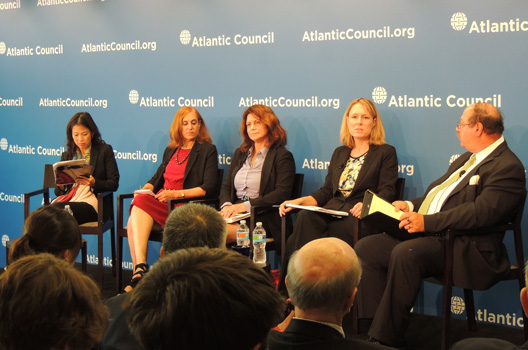 Taiwan is poised to beat the United States by electing its first female President in 2016. Former teacher and Nationalist (KMT) candidate Hung Hsiu-chu is battling her Western-educated Democratic Progressive Party (DPP) challenger Tsai Ing-wen for the presidency. Several prominent Taiwanese polls predict a Tsai victory, said Bonnie Glaser, a Senior Advisor for Asia in the Freeman Chair in China Studies at the Center for Strategic and International Studies.
Taiwan is poised to beat the United States by electing its first female President in 2016. Former teacher and Nationalist (KMT) candidate Hung Hsiu-chu is battling her Western-educated Democratic Progressive Party (DPP) challenger Tsai Ing-wen for the presidency. Several prominent Taiwanese polls predict a Tsai victory, said Bonnie Glaser, a Senior Advisor for Asia in the Freeman Chair in China Studies at the Center for Strategic and International Studies.
Taiwan’s current President, Ma Ying-jeou, belongs to the KMT. His party’s policies have boosted Taiwan’s economy, but rendered the island beholden to its now-largest trading partner and debtor—China. The island’s exports to China grew from 27.1 percent in 2012 to 40 percent last year, said Glaser. Economically, she said, the “picture is not bad, but Taiwan may have significant challenges.”
Glaser spoke at a September 9 panel discussion, hosted by the Asia Security Initiative of the Atlantic Council’s Brent Scowcroft Center on International Security, on the Taiwanese election to be held in January of 2016.
She was joined in the discussion by Carla Park Freeman, Associate Director of the China Studies program at Johns Hopkins University’s School of Advanced International Studies; Robert Manning, Senior Fellow in the Scowcroft Center; and Meredith Miller, Vice President for Southeast Asia in the Albright Stonebridge Group. Nike Ching, a Senior Foreign Affairs Correspondent with Voice of America’s Mandarin service, moderated the discussion.
Warming ties between Taiwan and China nurtured a higher degree of economic dependence on China, which, according to Glaser, has politicized the Taiwanese youth.
Student protests over textbooks that are seen as promoting Beijing’s one-China policy and Sino-Taiwanese trade service agreements embody an electorate favoring practical proposals that energize the island’s economy and an involvement in geopolitical issues such as cross-strait relations.
A “growing percentage want independence,” Glaser said, but prefer the “status quo” out of fear of isolation as “mainland China is keeping Taiwan out of the international economic community.”
Opinion polls in July showed DPP dwarfing KMT by twenty percentage points. Therefore, as the panel agreed, the 2016 election is Tsai’s race to lose.
Government polls consistently highlight the majority of Taiwanese support the “status quo” over warming Sino relations. In such an atmosphere Tsai is the optimal candidate as her party advocates cautious dialogue with China, treating Taiwan as autonomous.
China has been relatively silent on the Taiwanese election, which explains the election’s peripheral existence in US political discussions. The elections fail to garrison any congressional “attention because cross-strait relations have been relaxed,” said Miller.
While the mainland favors KMT, and may lobby Taiwanese business leaders, Freeman said how the ruling Taiwanese party interprets the 1992 consensus determines China’s course of action. This complicated and semi-official Beijing-Taipei pact establishes one Chinese nation under which two states exist, but is ambiguous regarding the definition of control. Essentially, Taiwan and China acknowledge the other’s existence, but agree to disagree on the definition of who controls these two states.
Noting Tsai’s likelihood for victory, Freeman said, she is “not sure how China is going to move forward if Taiwan accepts a ruling party not recognizing the 1992 consensus.” She warned that an uncompromising DPP on the definition of “one China” might “push China to not support Taiwan’s place in the international economic community.”
Countries outside the Strait, Miller said, are primarily concerned with “regional stability.”
During any conflict, Manning said, “choosing between the US and China” will be the biggest decision for Asian countries.
Japan, for example, will weigh its ties to the United States against China’s requests “to get Japanese investment in their economy,” but ultimately Japanese President Shinzo Abe will support the United States, he added.
“China has historically always tested new Presidents,” Manning said, but warned China’s relative tranquility belies impatience.
The world must play the waiting game until the turn of the tide
Matthew Lynch is a Communications intern with the Atlantic Council.
Image: From left: Voice of America’s Nike Ching moderates a panel discussion on the elections in Taiwan at the Atlantic Council September 9 with Bonnie Glaser of the Center for Strategic and International Studies, Carla Park Freeman of Johns Hopkins University’s School of Advanced International Studies, Meredith Miller of the Albright Stonebridge Group, and the Atlantic Council’s Robert Manning.

